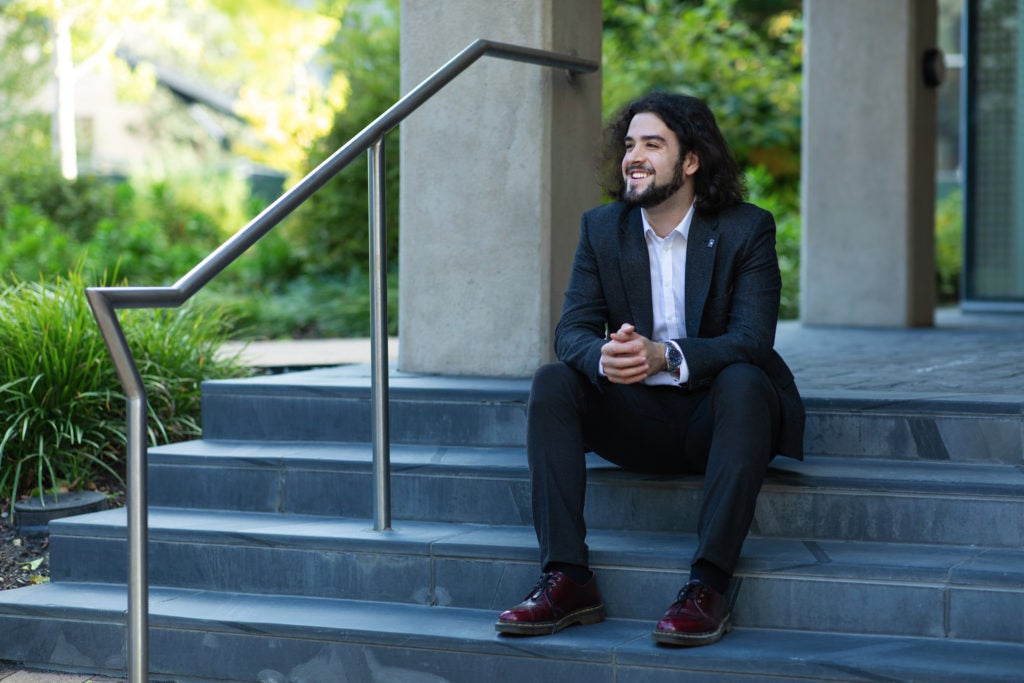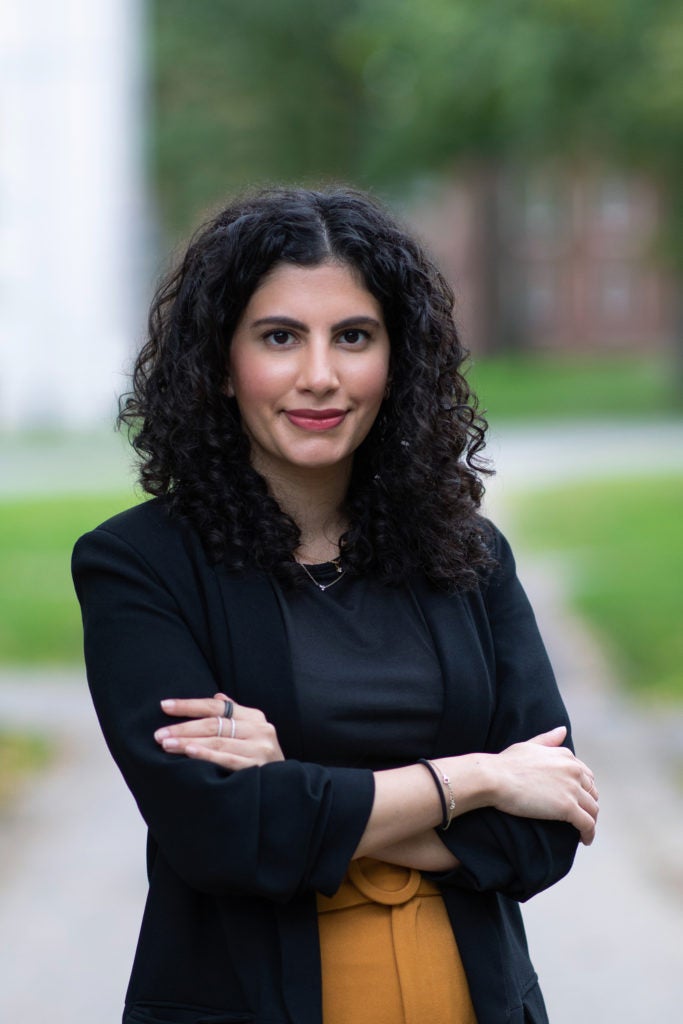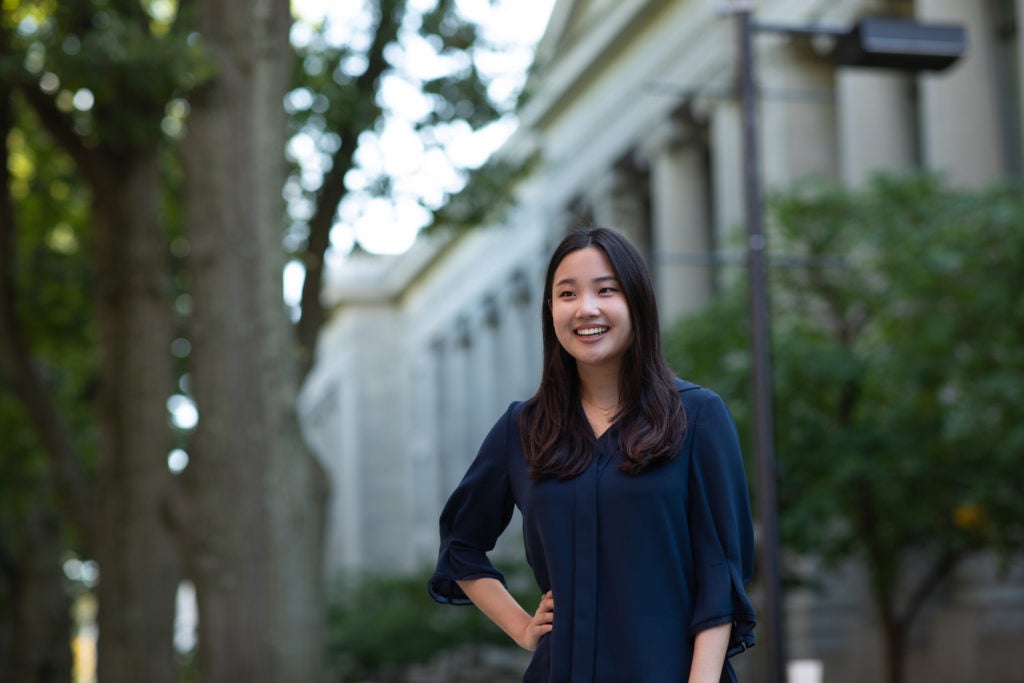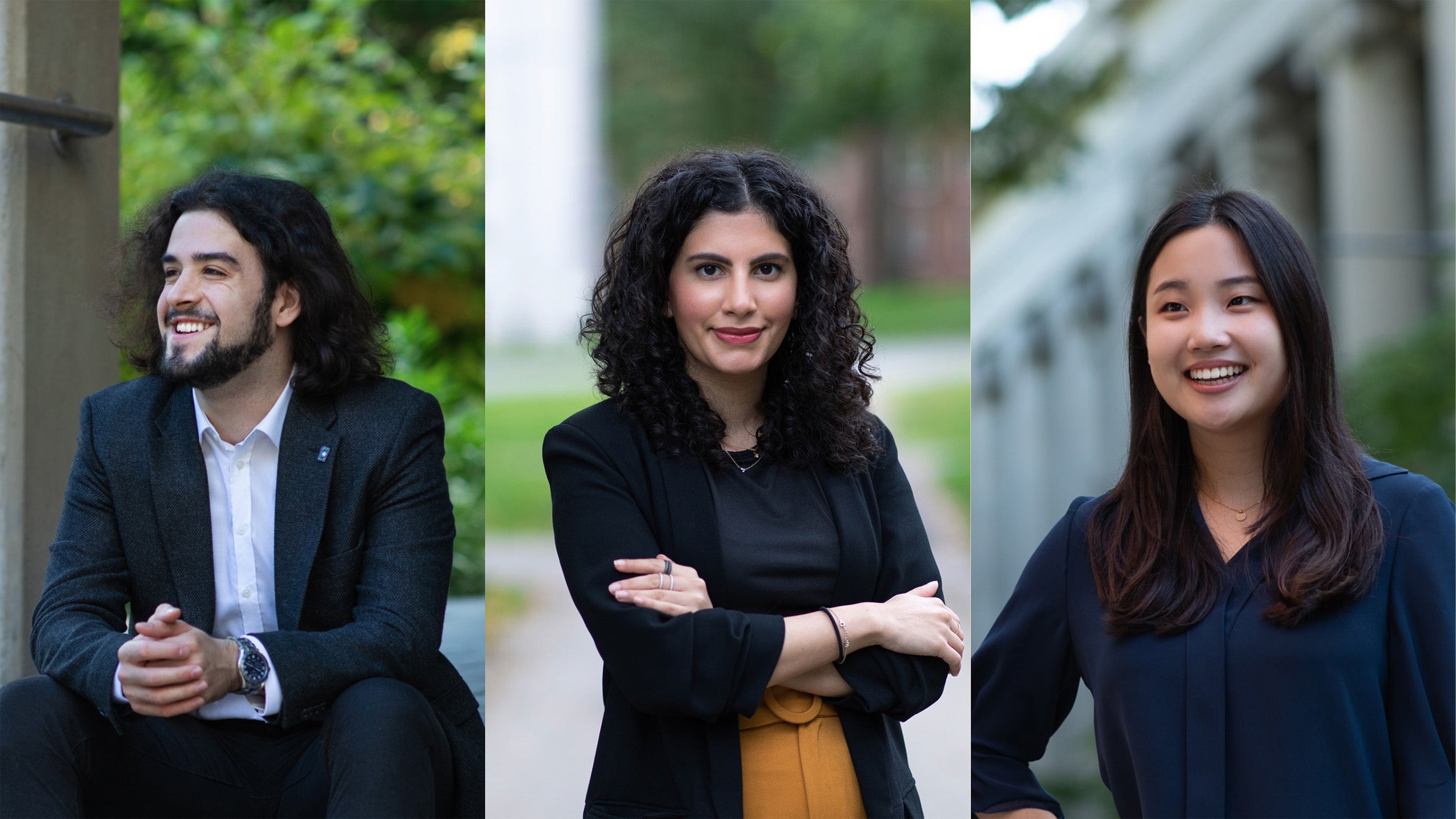In 2020, 24 Harvard Law School students pursued summer work as Chayes International Public Service Fellows. The program, established in 2001 and dedicated to the memory of HLS Professor Abram Chayes ’49, allows HLS students to spend eight weeks working with governmental or nongovernmental organizations concerned with issues of an international scope or relevant to countries in transition.
Although the COVID-19 pandemic made it necessary for all but one of the fellows to work remotely, they undertook placements with organizations based in 12 countries. Several students engaged in direct client service, addressing the many challenges facing refugees, asylum seekers and marginalized populations in countries around the world. Others, including the three Chayes Fellows profiled here, focused on legal research and writing, enhancing their skills and exploring issues that broadened their exposure to international, comparative and foreign law.
Ata Nalbantoglu ’22
New Markets Lab, Washington, D.C.

Ata Nalbantoglu ’22 spent this summer working with New Markets Lab, a Washington, D.C.-based nongovernmental organization (NGO) that addresses how international law and regulations can promote sustainable economic development. “What they emphasize is a good partnership between theory and practice,” he says.
One of Nalbantoglu’s main projects was to co-author a chapter for a book that the NGO will publish later this year. Many different authors and researchers—from law students to expert practitioners—are contributing to the book, which is intended as a practical guide to international trade and sustainable development in a post-COVID economy.
Given a choice of topics to work on, Nalbantoglu selected the “circular economy,” a relatively new concept that he found deeply intriguing. “It really reimagines everything,” he says. “Right now we have a linear model—we extract, we use and we throw away.” A circular economic system, on the other hand, focuses on treating what is left behind as an asset and reducing the extractive use of finite resources.
The pandemic, he explains, is a good example of why this matters. The supply chain and labor challenges that have occurred during COVID demonstrate that “we weren’t really prepared for this sort of crisis. In the circular economy, you embed that resiliency. Everything you create is built with the idea of sustainability in mind.”
For example, “when COVID struck, a lot of work was unavailable and people were out of a job. But in a circular system, you would constantly invest in your labor force—Singapore does this really efficiently—so that workers are ready for any crisis that might come. If they were in manufacturing, they could easily transition into cloud support work. You create these layers of security—anywhere along the way, if something breaks, the system is ready to step up.”
In addition to co-authoring the book chapter, Nalbantoglu joined an NML team participating in a “Policy Hackathon,” sponsored by the United Nations Economic and Social Commission for Asia and the Pacific, on the role of trade in rebuilding the international economy after the pandemic. The team prepared a 100-page report, “Re-conceptualizing Free Trade Agreements Through a Sustainable Development Lens,” with Nalbantoglu focusing on food, labor and medical supply shortages and how a circular economy might address them. The team’s work was selected for the commission’s online repository and identified by its Expert Group as one of the submissions “standing out in terms of quality, relevance, comprehensiveness and/or originality.” The U.N. is now considering how to organize webinars that would allow the hackathon participants to share their ideas with interested parties from its member countries.
For both projects, Nalbantoglu immersed himself in regional and international trade agreements, guidance from the World Trade Organization, the Organisation for Economic Co-operation and Development, and other international bodies, the legislation of different countries, and the ways in which international treaties and conventions govern the movement of goods across borders. He admits that he initially found the work difficult, but he was able to use skills he developed in his 1L coursework—reading quickly but attentively, outlining, and “finding one good case”—and benefitted from collaborating with HLS reference librarians. He also consulted with the law school’s Food Law and Policy Clinic to consider domestic and international solutions to the food shortages that have occurred during the pandemic.
Nalbantoglu worked closely with Katrin Kuhlmann ’96, the NGO’s founder and president, and considers her a mentor. “When we reported on what we had read about or learned, she consistently asked us what we would envision to make things better.”
“Even in something as restrained as a trade agreement there is always room for improvement. This has really shifted my perception of what working in trade law and policy could be like,” Nalbantoglu says. His interest in food security has also grown, just from seeing how much potential there is for new approaches. As an undergraduate at Washington University in St. Louis, he worked in the school’s Campus Kitchen, where students cooked with food that would otherwise have gone to waste. “Using the food was a solution—it met the immediate need of the people who rely on it—but it didn’t really address how the food was being wasted,” he recalls. “Now, when somebody reads my report, they will see some ideas on how the world might change.”
Mira Naseer ’22
Minority Rights Group International, London

Even though she conducted her placement remotely, instead of spending the summer abroad as planned, Mira Naseer ’22 was still able to work with Minority Rights Group International (MRG), a London-based NGO that seeks to hold governments accountable for human rights violations against minority and indigenous communities. In researching possible placements, she was drawn to the organization’s strategic litigation efforts. “The cases just looked incredibly interesting to me, and [were] along the lines of what I want to do, in terms of working with regional human rights tribunals,” she says.
Her choice had another dimension. “A lot of my experience before law school was with very large organizations”—she worked with Amnesty International and the U.N. High Commissioner for Refugees—“so I really wanted to know what it would be like to work at a small organization and on a small legal team, and how that differs.” At MRG, “it was really a hands-on experience. From that I realized that I actually preferred this smaller environment. You get thrown into the fire, with a lot more responsibility, but you learn so much more.”
Among other projects, Naseer worked on two active cases, one before the African Commission on Human and Peoples’ Rights and the other before the African Court on Human and Peoples’ Rights. The case before the African Court involved the Ogiek people, an indigenous community who “have been custodians of a forest in Kenya for time immemorial,” Naseer explains. The forest has been converted into a national park, and the Kenyan government has been accused of evicting the Ogiek, stripping them of their land rights, and displacing them. MRG is “advocating for their land rights, as well as their economic, social, and cultural rights, to have access to those lands and also for them to help with preservation, because they understand the conservation needs so well,” she says.
Hearings on the case had been delayed due to COVID-19, but MRG learned over the summer that the situation on the ground had deteriorated and that the court might be ready to move ahead. Naseer, who wrote a press release for MRG that details the situation, was tasked with analyzing the rules of the African Court and “how we could push the court toward providing provisional measures for the group that we were representing,” she says. “Not only was I given quite a bit of responsibility to come up with a strategy, but [that] strategy was pitched to our partner organizations in Africa and then used in arguments before the court.”
“Through this work, I was able to refine my international case law research and writing skills, as well as my voice as an advocate,” she notes. “I also learned a great deal about the complexities of litigation before regional human rights bodies.” Naseer relied on the assistance provided by HLS reference librarians, setting up a call early in the summer to discuss the best ways to conduct her research and requesting their help in locating specific cases.
When it comes to legal research and writing, “you get a good foundation in your 1L year, but it’s not the same as writing for an actual client, with an actual deadline, with case law on a topic where there’s not really much out there,” she observes. “It requires you to be creative and think about how you can frame an argument. Being a good advocate requires a very different writing style, when it’s an uphill battle to convince the court to issue some kind of remedy.”
In her 2L year, Naseer has enrolled in HLS’ Immigration and Refugee Clinic. “I’m able to bring in a lot of the skills I developed this summer—developing my voice as an advocate, and learning how to craft arguments in a persuasive way,” she adds. She also plans to focus her coursework on human rights and international law, and will spend next summer at the ACLU “doing litigation related to one of the most pressing domestic human rights issues: immigrant and refugee rights.” Her summer at MRG, she says, “confirmed my interest in human rights litigation and has given me a strong foundation for continuing this kind of work in the future.”
Jung Hyun (Monica) Lee ’22
Advocates for Public Interest Law, Seoul

Given her interest in human rights and in pursuing a career at the U.N. or another international organization, Jung Hyun (Monica) Lee ’22 originally planned to work in Geneva at the U.N.’s Office of the High Commissioner for Human Rights. But when COVID-19 erupted earlier this year, Lee returned home to Korea, and the Chayes program helped her identify an alternative placement in Seoul.
Lee worked this summer with Advocates for Public Interest Law, an NGO that employs litigation, legislative advocacy, and education to protect the human rights of refugees, victims of human trafficking, stateless persons, migrants held in detention, and victims of Korean companies’ human rights abuses abroad.
“Thankfully, this allowed me to try out a lot of different experiences,” Lee notes. During her placement, she researched case law, country condition reports, and international conventions in support of the NGO’s current cases, exploring issues ranging from foreign courts’ treatment of forced marriage as persecution to whether confiscating passports from asylum seekers violates international conventions.
She also reviewed governmental responses to COVID-19 and their impact on refugees. “The Korean government excluded refugees from its COVID-19 national economic relief program,” she says, and it has also refused to grant visa extensions for foreigners, citing the pandemic. To support litigation challenging these actions, Lee examined the provisions of other countries’ relief programs, as well as foreign case law and legislation on visa extensions during the pandemic.
Lee worked directly with clients as well, helping to conduct interviews with refugees from Ethiopia, South Sudan, and Nigeria. “These interviews included heart-wrenching stories, involving deaths of family members, separation, discrimination, and violence,” she says. Lee worked closely with a man from South Sudan who had exhausted all of Korea’s domestic procedures for securing refugee status. “I spent the most time with this refugee in order to get a clear understanding of the facts of his case, from his birth, to his refugee application, to detainment,” she says. She then drafted an individual complaint to the U.N. Human Rights Committee. Learning about legal research and writing during her 1L year was invaluable, Lee says, as the complaint included a facts section and an argument that Korea violated the International Covenant on Civil and Political Rights by rejecting the individual’s application and arbitrarily detaining him.
Lee also observed proceedings in Seoul’s Central District and Administrative Courts, for cases involving human trafficking and refugee status. And during the summer, one of her supervisors won a case before Korea’s Supreme Court, in which the Court recognized, for the first time, that infants born in Korea as Korean citizens had the right to have their births registered. “This was a huge milestone,” Lee adds. This significant decision, and watching direct and cross examinations in court, “kindled my interest in litigation. I realized how impactful it can be.”
This fall, Lee is taking a course on Human Rights and International Law and one on Communication, Law and Social Justice. “We’re learning about the U.N. Human Rights Committee, for example; I’m actually bringing in a lot of the experiences that I gained this summer,” she observes. She is also an editor of the Harvard International Law Journal and is involved in the Harvard International Arbitration Law Students Association.
Her work with APIL has confirmed her interest in a career in international law, possibly focusing on human rights, or on international arbitration and litigation. In her 1L summer, “I was able to experience first-hand what it is like working at an NGO,” she says, and she was inspired by the lawyers she worked with there. “They are enraged by the injustices but work passionately and happily to end them. I hope that I will be able to have this sense of purpose in my career as well.”
